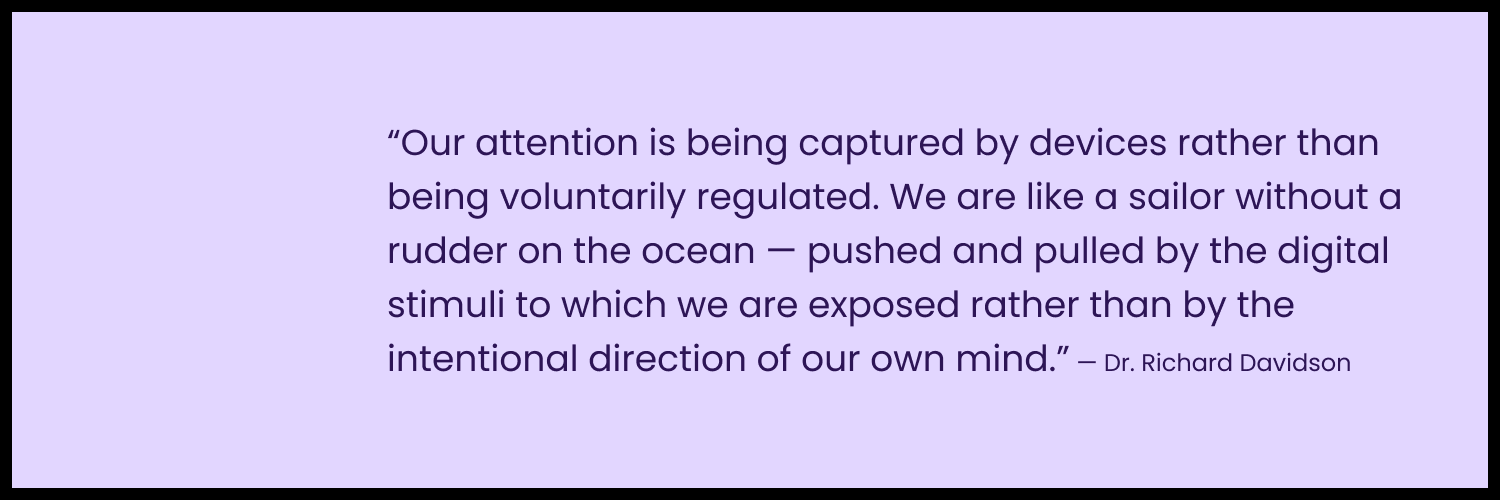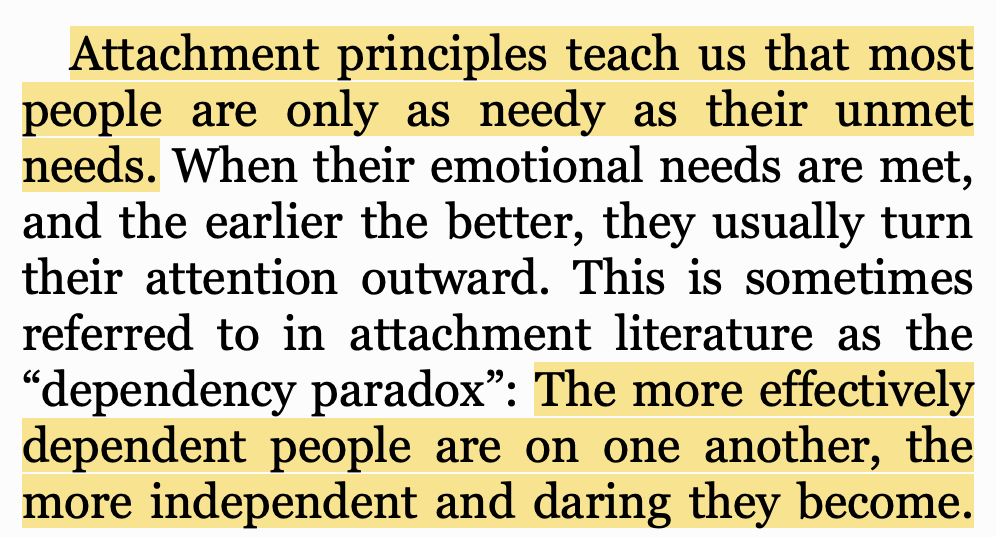2021-09-16
# David Perell
# Median Class Sizes
#education #technology #edtech
Schools always brag about small class sizes. The smaller, the better. But the more teachers you have per student, the more expensive education becomes. Therefore, there’s been a direct tradeoff between class size and accessibility.
The Internet invalidates that. For digital education, you simultaneously want to replicate the effects of bigger and smaller class sizes. Big class sizes bring benefits of scale, and when you’re teaching on the Internet, tens of thousands of students can take a class together. All those people make it possible to invest in Hollywood-level production values. It’s only a matter of time before the best teachers have sets as impressive as Scott Van Pelt’s Sports Center studio.
Then there’s personalization.
The psychologist Benjamin Bloom found that “one-on-one tutoring using mastery learning led to a two sigma improvement in student performance.”
The key question in education is: ==How can we replicate these results without the high costs of one-on-one tutoring?==
The answer: software.
Like a good tutor, software can instantly adapt to student proficiency. It can accelerate the curriculum for students who are crushing it and slow it down for struggling students. Unlike a tutor, a well-built program will be able to learn from a global data set of learning patterns. Done right, learning software will be as enjoyable as video games and as productive as one-on-one tutoring.
Together, ==the production benefits of big classrooms and the personalization of software make the median classroom size debate irrelevant.==
# Teachers Should Raise Ambition
When people think of a teacher, they usually think of somebody who delivers information. Sharing facts and knowledge is an important part of the job, but we undervalue ==the role of inspiration.== When it comes to gaining muscle, I can learn the tactics from anybody. Eat a lot. Workout consistently. Embrace progressive overload. But psychologically, working with her has been a game-changer. ==In our age of anything goes mediocrity, it’s rare to find people who set high standards and meaningfully raise your ambitions. School would be more effective if teachers focused on more than information delivery. ==
# Gatto’s Seven Lessons
John Gatto spent 30 years as a New York City school teacher. In this critique, he argues that ==the modern education system is designed to produce confused, passive, dependent, and materialistic children.== The most surprising idea is about literacy rates. Gatto points to a paper released by Senator Ted Kennedy’s office that the literacy rate was 98% before the advent of compulsory education. By 1990, that figure had dropped to 91%. Though the argument doesn’t quite pass the sniff test, I’ve long doubted the validity of literacy rate measurements. No matter what, Gatto’s speech is worth reading in full.
- Confusion
- Class Position
- Indifference
- Emotional Dependency
- Intellectual Dependency
- Provisional Self-Esteem
- Ome Can’t Hide
# Dense Discovery
#technology #society To read: Exponential by Azheem Azhar
# Rabbit Holes
#personaldevelopment #philosophy
# Personal Development
My Path to Entrepreneurship: Leaving “Follow Your Passion” Bullsh*t for Curiosities
If I’ve learned anything, it’s that the entrepreneurial journey is not about accomplishing your wildest dreams. It’s about becoming the type of person who has ==curiosities.== Whether we call them Daimon whispers or not does not matter. What matters is that we simply possess the courage to follow them. Just as Arjuna is instructed in the Bhagavad Gita, we must pick up the sword and go into battle—without concern for the outcome. To keep waxing on this, it’s about embracing a life so drenched in meaning, nothing’s ever left undone. The ultimate mode of being is surrendering to life just as it is. To be ==entirely engaged== in our metamodern world in 2021, yet ==completely unattached== to it. To understand we are starlight dressed as matter, yet also be able to laugh at the messiness of our human selves.
Daimon - the voice inside of us
“The goal of life is to match your heartbeat to the beat of the universe.” —Joseph Campbell
Gut, intuition, the whisper.
All words to describe the quiet yet wise inner voice Greeks called the Daimon (pronounced “day-mon”).
The Greeks believed the Daimon to be the soul communicating with the body, the timeless and formless interacting with our time-bound, finite forms. An inner voice between the mortal and the divine. It drives us towards ==fulfilling our purpose, sharing our unique gifts with the world. ==
We all hear the Daimon’s whisper, but we are stuck in a culture that makes it hard to heed its call: Netflix and chill, mindless scrolling through Instagram, and one-day Prime deliveries are all Daimon-suppressants. We also must acknowledge that even ==to hear a Daimon requires a stress-free, privileged existence—and even more privilege to succumb to its calling.==
To Study:
- Building a what’s next deck
- Mindy Zhang
- Coaching: working with leaders and high achievers to close the gap between where they are and where they want to be.
- The Reset: a guide for high achievers seeking greater clarity and fulfillment.
- Core Values
# Philosophy
#spirituality #mentalhealth Awakening from the meaning crisis
50 lectures series’ on how ==cognitive science, existential philosophy, Buddhism, Hellenistic philosophy and psychedelics can be used to address the meaning crisis.==
John Vervaeke, PhD is an award-winning lecturer at the University of Toronto in the departments of psychology, cognitive science and Buddhist psychology. In this series Vervaeke will give the history of the meaning crisis, how it is affecting society today, and then give an account on how we can address this problem. He weaves together historical narrative and contemporary science to paint a compelling picture of foundation of the meta-crisis of out times.
If you prefer cliff-notes check out this google doc for notes on every episode.

How an intense spiritual retreat might change your brain
Have you ever wondered what “enlightenment” felt like?
Based on an analysis of approximately 2,000 descriptions provided in an online survey, the study found that five elements seem to be common across many enlightenment experiences:
- Intensity
- A sense of oneness or unity
- A sense of clarity
- A sense of unity
- A sense of surrender
Amir Levine & Rachel Heller, Attached

# Tools & Products
#investing #design
- On creating a portfolio of small bets
- ** How to invest **
- Notes on designing games
# SocSci13
#sociology #economics
When we think of a metric, we might imagine it in the form of a statistic, a number, or even a chart or a graph, as seen above. We tend to forget that ==these representations are actually concrete things that affect lives and livelihoods==, and that ==the story of development is about the world and the people that live in it.==
Please remember that ==there is a story behind every number that appears in a metric.== Our goal is to ==build a humane world by understanding it in the most nuanced way possible==, even if that sometimes means we have to express this understanding in a simple model.
Among the different metrics mentioned in this module, which ones appeal to you the most? How do they measure development? How can these parameters express problems in society? Which ones might best apply to methodologies related to your sector in NSTP (the respective institutions you’re working with in Tubigon, Bohol or Rizal)? What statistics and indicators do you think are important to pay attention to as we discuss sustainable development?
For my group’s partner organization, Yamang-dagat Angkop sa Kababaihan at Pang-kabuhayan Inc. (YAKAP), I believe the most appropriate metric to be the “Capabilities Approach” by Amartya Sen. According to him, economic freedom should be focused on developing the capabilties of those in need (i.e. marginalized citizens of developing countries). I love this model because it prioritizes increasing freedom over productivity, making it more humane. Since YAKAP is focused on women’s livelihood, this approach can be applied through providing education. Being more educated enables them to have more personal freedom.